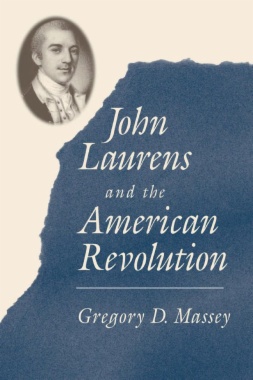A historical figure's attempts to secure freedom for America and its enslaved population
Winning a reputation for reckless bravery in a succession of major battles and sieges, John Laurens distinguished himself as one of the most zealous, self-sacrificing participants in the American Revolution. A native of South Carolina and son of Henry Laurens, president of the Continental Congress, John devoted his life to securing American independence.In this comprehensive biography, Gregory D. Massey recounts the young Laurens's wartime record —a riveting tale in its own right —and finds that even more remarkable than his military escapades were his revolutionary ideas concerning the rights of African Americans.
Massey relates Laurens's desperation to fight for his country once revolution had begun. A law student in England, he joined the war effort in 1777, leaving behind his English wife and an unborn child he would never see. Massey tells of the young officer's devoted service as General George Washington's aide-de-camp, interaction with prominent military and political figures, and conspicuous military efforts at Brandywine, Germantown, Monmouth, Newport, Charleston, Savannah, and Yorktown. Massey also recounts Laurens's survival of four battle wounds and six months as a prisoner of war, his controversial diplomatic mission to France, and his close friendship with Alexander Hamilton. Laurens's death in a minor battle in August 1782 was a tragic loss for the new state and nation.
Unlike other prominent southerners, Laurens believed blacks shared a similar nature with whites, and he formulated a plan to free slaves in return for their service in the Continental Army. Massey explores the personal, social, and cultural factors that prompted Laurens to diverge so radically from his peers and to raise vital questions about the role African Americans would play in the new republic.
- Cover
- John Laurens and the American Revolution
- Title
- Copyright
- Dedication
- Contents
- Illustrations��������������������
- Family Line of John Laurens����������������������������������
- Preface��������������
- Acknowledgments����������������������
- Abbreviations��������������������
- Note on the Text�����������������������
- Introduction�������������������
- Chapter 1 “An ornament to his country”: Early Life in Charleston�����������������������������������������������������������������������
- Chapter 2 The Voltaire of Carolina: Sojourn in Geneva, October 1771–November 1774����������������������������������������������������������������������������������������
- Chapter 3 “I hate the Name of the King”: Biding Time in England, November 1774–December 1776���������������������������������������������������������������������������������������������������
- Chapter 4 “Standing on the verge of Eternity”: The War in America, January–December 1777�����������������������������������������������������������������������������������������������
- Chapter 5 “Those dear ragged Continentals”: Winter at Valley Forge, December 1776–June 1778��������������������������������������������������������������������������������������������������
- Chapter 6 “That bravery which becomes freemen”: The 1778 Campaign, June–December 1778��������������������������������������������������������������������������������������������
- Chapter 7 “White Pride & Avarice”: The Limits of Independence in the South Carolina Low Country, January–December 1779�����������������������������������������������������������������������������������������������������������������������������
- Chapter 8 “The greatest and most humiliating misfortune of my life”: The Fall of Charleston, January–December 1780�������������������������������������������������������������������������������������������������������������������������
- Chapter 9 “His inexperience in public affairs”: Special Minister to France, December 1780–September 1781���������������������������������������������������������������������������������������������������������������
- Chapter 10 “The single voice of reason”: Military Triumph and Political Defeat, September 1781–February 1782�������������������������������������������������������������������������������������������������������������������
- Chapter 11 “The Campaign is become perfectly insipid”: The South Carolina Low Country, February–August 1782������������������������������������������������������������������������������������������������������������������
- Chapter 12 “The loss is remediless”: The Family of John Laurens, 1782–1860���������������������������������������������������������������������������������
- Epilogue���������������
- Notes������������
- Bibliography�������������������
- Index������������

